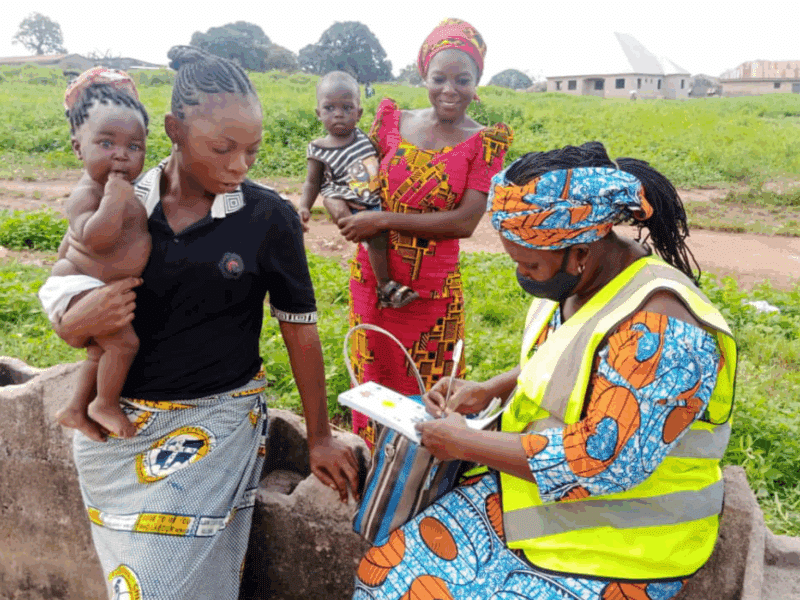Finding relevant and credible family planning and reproductive health information can be a real challenge for young people in French-speaking West Africa.
Sure, they have access to Google and the massive amount of information on the internet, but the web often includes questionable material from dubious sources. Young people from the region told the Johns Hopkins Center for Communication Programs-led Breakthrough ACTION project that they need information they can trust and act upon at their fingertips – including how to access the best services for their needs right in their home countries.
This is how a new chatbot, co-designed with youth from across the nine West African countries that make up the Ouagadougou Partnership, came to be.
The chatbot, known to local youth as “DSSR-Bot,” serves as a regional interactive family planning information center and can be accessed by young people where they are: On private messaging apps such as WhatsApp, Telegram, Signal and more. All they have to do is ask the chatbot a question and they’ll be directed to the information they seek.
While some countries using the chatbot have more information than others on where to get youth-specific services locally, the goal is to beef up those sections in 2023.
One benefit of the chatbot is that it includes the answers to many frequently asked questions in one easy-to-use location.
Now, young people, “have a place to get the information quickly. They don’t need to sort through a bunch of websites and read between the lines to get credible information,” says CCP’s Mohamed Sangare, a Senegal-based social and behavior change regional advisor for Francophone West Africa. “On the internet, anyone who has a computer can publish a website.”
With the chatbot, youth will know that whatever answers they receive will be evidence-based, he said.
The demographics in many French-speaking West African countries skew young. Very young. The under-25 age group accounts for 77.8 percent of the population in Benin, 66 percent in Mali, 64.8 percent in Côte d’Ivoire and 63 percent in Mauritania. That’s why Breakthrough ACTION has gone digital with this program, says CCP’s Antonia Morzenti.
In 2020, the Ouagadougou Partnership — a partnership between governments, civil society, and donors from nine francophone West African countries who strive to improve the quality and uptake of family planning services in the region — updated its strategy to make youth the focus going forward. One operating principle of this new initiative, the OP Strategy Beyond 2020, is giving young people a powerful voice in defining their own agenda and priorities.
In July 2022, Breakthrough ACTION led a regional workshop to design the chatbot. The workshop involved and trained 110 youth chosen from across the nine Ouagadougou Partnership countries. Over four training sessions, facilitators introduced the concept of chatbots and guided participants through the process of creating and managing one.
After the training, Breakthrough ACTION held additional coaching sessions for each of the Ouagadougou Partnership countries as they continue to finalize their own chatbots as well as provided tutorial videos that could be referred back to as needed. The chatbot includes information has information on eight topics with 78 questions and answers more than 185 frequently asked questions related to family planning, reproductive health and gender concerns.
With a soft launch in late 2022 and a big push planned for this year, millions of youths will soon have this information at their fingertips via a simple instant message on any instant messaging platform that directs users to the chatbot. In the pre-testing phase, more than 5,000 youth used the chatbot over three months.
A chatbot was chosen over a call center, for example, because young people really prefer not to talk on the phone, Sangare says, and they are worried they will know the person who answers the phone at the center. This way, their privacy is protected.
Currently in French, some countries are hoping to expand the chatbot to other local languages. The chatbot will soon be promoted via youth organizations in the countries and ministries of health.
Breakthrough ACTION created a similar chatbot for COVID-19 information in Mali, which also included an option for those with poor literacy skills to leave voice messages and have their answers provided also via voice.
“We want this to be used by the maximum number of young people in all nine countries that are part of the Ouagadougou Partnership,” Sangare says.
The Ouagadougou Partnership was launched in 2011 with the goal of accelerating progress in the use of family planning services in nine countries: Benin, Burkina Faso, Cameroon, Côte d’Ivoire, Guinea, Mali, Mauritania, Niger, Senegal and Togo.





